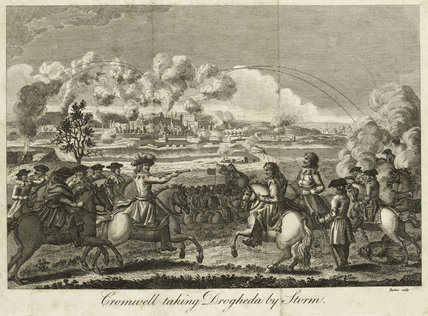
Drogheda – An Everlasting Blot?

Introduction
The Irish rebelled in 1641. The Irish Catholics killed many Protestants.
In 1649, after Charles I's execution, Cromwell went to Ireland to re-conquer the rebellious Irish. The first town he attacked was Drogheda.
After you have studied this webpage, answer the question sheet by clicking on the 'Time to Work' icon at the top of the page.
Links:
The following websites will help you research further:
The Massacre at Drogheda:
•
BBC KS3 Bitesize site
• A
19th century textbook written by an Irish Catholic nun
• This article written for an Irish newspaper labels Cromwell's actions at Drogheda 'war crimes'
• A
scholarly (and long) article written for the magazine
History Today by Irish historian Tom Reilly, who claimed that Cromwell was
owed a
huge apology by the Irish people.
Cromwell's Account of the Capture of Drogheda
1 A letter from Oliver Cromwell to the House of Commons, 17 September 1649.
I asked the governor to surrender, but I got no satisfactory answer...
The guns opened two good gaps in the wall. About five o'clock in the evening, we began the attack ... and after a very hot battle they gave ground. The enemy retreated into the Mill-Mount, a place very strong ... and being in the heat of action, I forbade our men to spare any that were in arms in the town, and, I think, that night we put to the sword about 2,000 men...
The next day, the two towers were summoned to surrender; but they refused. From one of the towers, they killed and wounded some of our men – when they submitted, every tenth man of the soldiers was killed. The soldiers in the other tower were all spared.
This is a judgement of God upon these barbarous wretches, who have dipped their hands in so much innocent blood; and it will stop the shedding of much blood in the future. These are the satisfactory excuses for my actions, which otherwise must give much sadness and regret..
2 Cromwell's men attack Drogheda; a picture from the time – in one modern textbook, this picture carried the caption: 'Cromwell's assault on Drogheda; here his army massacred men, women and children'.

Hero or Villain?
Over the years, historians have written many different things about Cromwell's victory at Drogheda. Sources 3-5 record the opinions of historians who lived close to the time; Sources 6-9 record the interpretations of modern historians.
3 A letter written by the Marquis of Ormond, 1649. Ormond was one of the Irish leaders, but he was not present at Drogheda.
Cromwell promised to spare the lives of any who would lay down their weapons ... but when they had surrendered, the order 'No quarter' went round.
6 Written by the English historian J.A. Froude, The English in Ireland (1881).
It is possible that, in such a scene, women and children may have been accidentally killed; but there is no evidence of it from any eyewitness, only general rumours. The Irish rebellion had cost nearly 600,000 lives. It was necessary to end such horrible scenes, and to end them swiftly.
5 Mercurius Politicus (3 June 1650), a newspaper published by the government.
His famous victories in Ireland ... have crowned him in the opinion of all the world as one of the wisest and most successful leaders of all time.
7 Written by the English historian M. Elliot, Tudors and Stuarts (1961).
The laws of war allowed him to do this, for he had given them a chance to surrender and they had refused it.
4 Written by the historian Anthony Wood, 1674. Wood was the brother of a soldier in Cromwell's army.
At least 3,000, besides women and children, were put to the sword.
8 Written by the children's writer R.J. Unstead, Crown and Parliament (1975).
His upbringing had made him fear and hate Roman Catholics... He had heard tales of massacres of Protestants in Ireland, and had come to regard the Irish as beyond forgiveness. Cromwell's cruelty in Ireland is an everlasting blot on the name of a great man.
9 Written by the historian Antonia Fraser, Cromwell (1973).
Cromwell lost his self-control at Drogheda... In the heat of the moment occurred the incident that has blackened Oliver Cromwell's name down history for 300 years.